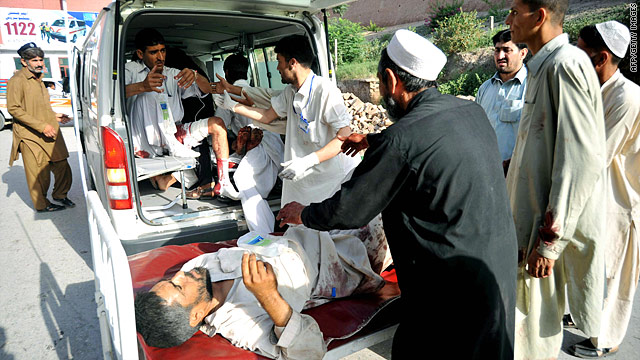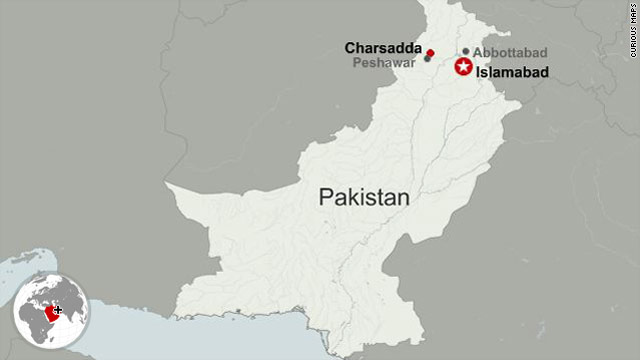 Islamabad, Pakistan The Pakistani Taliban claimed responsibility Friday for suicide attacks on a military training facility in the nation's northwest, saying they were carried out in retaliation for the killing of terrorist leader Osama bin Laden.
Islamabad, Pakistan The Pakistani Taliban claimed responsibility Friday for suicide attacks on a military training facility in the nation's northwest, saying they were carried out in retaliation for the killing of terrorist leader Osama bin Laden.The twin suicide bombings killed at least 80 people, nearly all of them military recruits who had just completed their training, said Bashir Ahmad Bilour, a senior provincial minister. About 140 others were wounded.
"Pakistani and the U.S. forces should be ready for more attacks," said Ihsan Ullah Ihsan, a spokesman for the Pakistani Taliban, who accused the Pakistani military of having alerted the United States to bin Laden's location.
"Osama was our great leader and the killers of Osama will have to pay its price," he said.



RELATED TOPICS
The back-to-back explosions took place shortly after scores of recruits had left the Shabqadar Fort, a training facility in the district of Charsadda, said Jahan Zeb Khan, a senior police officer.
Afterward, video of the blood-soaked ground outside the training facility showed it littered with burned vehicles and broken glass.
The recruits had just completed a nine-month training program when the attackers struck.
The district of Charsadda borders Mohmand Agency, one of seven districts in Pakistan's tribal region along the Afghan border.
Mohmand is believed to be a hideout for Taliban fighters and al Qaeda-linked militants fleeing last year's military operation in the district of South Waziristan and ongoing U.S. drone strikes in North Waziristan.
The Pakistani army has carried out numerous ground and air operations in Mohmand but it has not been able to stamp out the militants.
The Pakistani Taliban represent a confederation of Taliban groups in northwestern Pakistan, where they are based, said Bill Roggio, military-affairs analyst who is managing editor of The Long War Journal.
Those fighters attack targets in Pakistan and across the border in Afghanistan.
The group, which is headquartered in Quetta, is different from the Afghan Taliban, which has been focused on re-establishing the Islamic Emirate in Afghanistan.
Both groups swear allegiance to Taliban leader Mullah Omar and have close ties to al Qaeda, he said.
Last December, some 150 militants ambushed six security checkpoints in Mohmand, killing 11 Pakistani soldiers, officials told CNN.
Earlier in December, a twin suicide attack targeting a government building in Mohmand killed at least 40 people.
"They're clearly trying to disrupt our bilateral relationship through this attack," State Department spokesman Mike Toner told reporters. "But it's also clear that they are going to carry out these kinds of attacks no matter what."
But Imran Khan, a Pakistani opposition party leader, said the attacks show that the Pakistani government is doing a poor job managing the crisis.
"Unfortunately, we do not have a trustworthy, credible government," the chairman of Pakistan's Tehreek-e-Insaf (Movement for Justice) Party told CNN. "That's why I'm calling for the resignation of our own government, free and fair elections and a new, credible government," he said.
He cited government figures that cite 34,000 deaths and a $68 billion loss to the nation's economy as a result of terrorism. "The people of Pakistan are dying under this war on terror," he said.
Khan said Pakistan would be in a better position if it would simply decline U.S. aid. "Unfortunately, if Pakistan is considered a hired gun of the U.S., it reduces its capability to win this war on terror," he said. "If this becomes Pakistan's war, I think Pakistan will win the war. But if it's perceived that the Pakistani army is a mercenary army of the U.S., we have no chance of winning."
He added, "They target Pakistan because Pakistan is perceived as America's agents. That's why you see the sort of carnage that's taking place today."
Prior to 2004, there were no suicide attacks and no militant Taliban in Pakistan, he said. But things have changed. "Here's a country that had 500 bomb blasts last year."
The vast majority of the fighters are tribal people who are neither terrorists nor religious fundamentalists, he said. "They are fighting as a result of Pakistani military operations in the tribal area. So a credible government should have peace talks with them and then isolate the al Qaeda, which has worried the West."
No comments:
Post a Comment